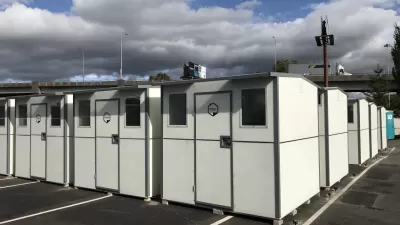The villages offer much-needed housing for homeless people, but controversy is brewing over their operations.

Scott Greenstone reports on the latest issues related to the siting of tiny-home communities in Seattle providing housing to homeless people. The villages offer an alternative to shelters, which lack the same level of privacy and community.
"But a continuing issue for the city has been the fact that tiny house villages [under city code] cannot remain open in one spot for more than two years, and most of the city-sponsored villages are already months and months past their respective deadlines," says Greenstone.
Recently proposed legislation would ease these requirements and let the housing facilities stay in place longer. But the organization operating the villages is also considering faith-community sponsors in an arrangement that could let the villages stay open without restrictions.
Conflicts between homeless advocacy groups and a lack of consensus among village residents about using church sponsorship to circumvent city code are complicating the situation, notes Greenstone. "[Eliana Scott-Thoennes'] concerns are that faith sponsorship allow the city to get around listening to community and resident input, and the city wouldn’t be required to keep an advisory council of neighborhood stakeholders like the one she chairs."

Planetizen Federal Action Tracker
A weekly monitor of how Trump’s orders and actions are impacting planners and planning in America.

Maui's Vacation Rental Debate Turns Ugly
Verbal attacks, misinformation campaigns and fistfights plague a high-stakes debate to convert thousands of vacation rentals into long-term housing.

Restaurant Patios Were a Pandemic Win — Why Were They so Hard to Keep?
Social distancing requirements and changes in travel patterns prompted cities to pilot new uses for street and sidewalk space. Then it got complicated.

Charlottesville Temporarily Has No Zoning Code
A judge ordered the Virginia city to throw out its newly revised zoning code, leaving permitting for new development in legal limbo.

In California Battle of Housing vs. Environment, Housing Just Won
A new state law significantly limits the power of CEQA, an environmental review law that served as a powerful tool for blocking new development.

Boulder Eliminates Parking Minimums Citywide
Officials estimate the cost of building a single underground parking space at up to $100,000.
Urban Design for Planners 1: Software Tools
This six-course series explores essential urban design concepts using open source software and equips planners with the tools they need to participate fully in the urban design process.
Planning for Universal Design
Learn the tools for implementing Universal Design in planning regulations.
Heyer Gruel & Associates PA
JM Goldson LLC
Custer County Colorado
City of Camden Redevelopment Agency
City of Astoria
Transportation Research & Education Center (TREC) at Portland State University
Jefferson Parish Government
Camden Redevelopment Agency
City of Claremont




























